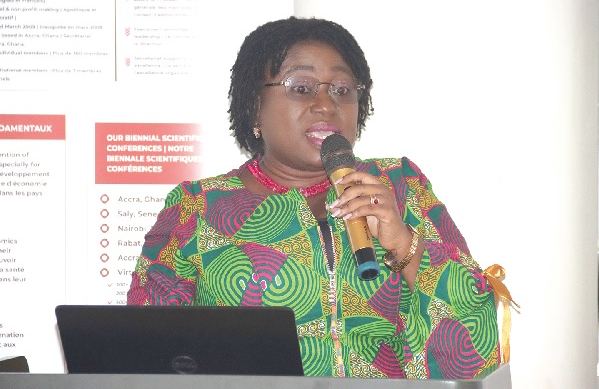Sexual health is a crucial aspect of adolescent reproductive health. However, a recent study conducted among 675 university students has revealed alarming statistics. Despite having a basic knowledge of adolescent sexual reproductive health (ASRH) issues, a staggering 93% of sexually active students admitted to not using contraceptives. This disregard for contraception highlights the need for increased attention from university authorities and policymakers to address the sexual health needs of adolescents in public universities effectively.
The Study and its Findings
The study, conducted by Dr. Gifty Ekua Merdiemah, a Research Fellow and Clinical Trials Coordinator at the University of Ghana Medical Centre (UGMC), shed light on the prevailing issue of unsafe sexual practices among university students. Dr. Merdiemah presented the study’s findings at a workshop organized by the African Health Economics and Policy Association (AfHEA), in collaboration with UGMC and the Institute of Statistical Social and Economic Research (ISSER).
The research was carried out between 2018 and 2021, involving three public universities in different zones of Ghana. The University for Development Studies (UDS) represented the northern zone, the Kwame Nkrumah University of Science and Technology (KNUST) represented the middle zone, and the University of Professional Studies, Accra (UPSA) represented the southern zone.
Dr. Merdiemah emphasized that adolescents’ health needs encompassed sexual reproductive health (SRH) education, sexual intercourse, and access to contraceptives. The study identified significant barriers to reproductive health facilities, such as the cost and location of healthcare services, hindering adolescents from obtaining appropriate reproductive healthcare. The recommendations put forth in the study emphasized the importance of collaborative efforts among stakeholders to implement policies and programs that address the SRH needs of adolescents in public universities effectively.
Addressing the Gaps in Sexual and Reproductive Health Education
Dr. Merdiemah further highlighted the need for all public universities to incorporate well-structured ASRH orientation programs and establish adolescent health corners at strategic locations within campuses. These health corners should provide a wide range of SRH services to ensure that adolescents have easy access to necessary resources. The Ministry of Education also plays a vital role in improving the situation by ensuring the presence of age-specific sex education programs in all educational institutions. These programs should be conducted by well-trained teachers and peer educators who can provide accurate information in a non-judgmental manner.
Bridging the Gap: Recommendations for Improved Access
Dr. Ama Pokuaa Fenny, from ISSER, presented findings from another study titled “Access to Adolescent Sexual and Reproductive Health Services in Ghana: A Qualitative Study.” Her research emphasized the inadequacy of sex education in schools and the lack of affordable and non-judgmental SRH services. To address these gaps and improve access to SRH, Dr. Fenny recommended comprehensive training programs for teachers and healthcare staff, enabling them to provide relevant sex education and adolescent-friendly services. Additionally, it is crucial to establish accessible and affordable SRH services that are free from stigma and judgment.
A Call for Action
Abdul-Rashid Hassan Pelpuo, the Member of Parliament (MP) for Wa Central, highlighted the importance of expanding the reach of information and services available to adolescents. It is essential to create multiple avenues through which adolescents can gain knowledge and access the support they need. By prioritizing the sexual and reproductive health of university students, policymakers and authoritiescan make a significant impact on reducing unsafe sexual practices and promoting responsible behavior.
In conclusion, the study’s findings indicate a concerning trend among sexually active university students, with a vast majority neglecting the use of contraceptives. This emphasizes the urgent need for increased attention and action from university authorities and policymakers. By implementing well-structured ASRH orientation programs, establishing adolescent health corners, and ensuring comprehensive sex education in schools, we can bridge the gap and provide adolescents with the knowledge and resources they need for safe and responsible sexual practices. It is crucial for all stakeholders, including universities, the Ministry of Education, and healthcare providers, to collaborate and prioritize the sexual and reproductive health needs of adolescents.
FAQs (Frequently Asked Questions)
- Why are so many sexually active university students not using contraceptives? Despite having a basic knowledge of adolescent sexual reproductive health, several factors contribute to the low usage of contraceptives, including lack of awareness, accessibility, and affordability. Comprehensive sex education and accessible SRH services are essential in addressing these barriers.
- What are some of the recommendations from the study? The study recommends the establishment of well-structured ASRH orientation programs, adolescent health corners with a range of SRH services, age-specific sex education programs in educational institutions, and training for teachers and healthcare staff to provide relevant and non-judgmental services.
- How can university authorities and policymakers address this issue effectively? University authorities and policymakers can take proactive measures by implementing the study’s recommendations. This includes allocating resources for ASRH programs, collaborating with healthcare providers, and integrating comprehensive sex education into the curriculum.
- What role does the Ministry of Education play in improving adolescent sexual and reproductive health? The Ministry of Education plays a crucial role in ensuring that age-specific sex education programs are incorporated into all educational institutions. They should also prioritize the training of teachers and peer educators to provide accurate and non-judgmental information.
- What can individuals do to promote safe sexual practices among university students? Individuals can contribute by raising awareness about the importance of safe sexual practices, advocating for comprehensive sex education, and supporting initiatives that provide accessible and affordable SRH services for adolescents















